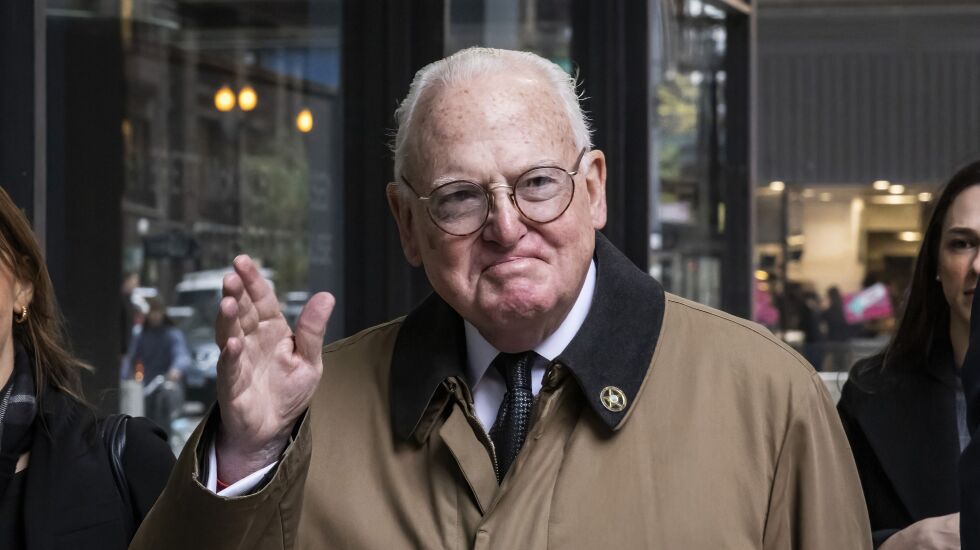
Under Illinois law, former Ald. Edward M. Burke is likely to be stripped of the $8,027-a-month city pension he started collecting last May on the day after ending his record 54-year reign in the Chicago City Council.
Two weeks after a jury convicted him of racketeering, bribery and attempted extortion, officials with the Municipal Employees’ Annuity and Benefit Fund of Chicago won’t say when — or even whether — they will revoke his benefits.
No matter, he will get at least the $540,000-plus that he paid into the fund, which covers most city workers other than firefighters, police officers and laborers, pension records show.
The disgraced former council dean is in line for a more substantial payout from his campaign fund, which he can use to pay himself or his family members almost $2.5 million, no questions asked, thanks to a loophole in state campaign-finance law.
Burke, now 80, is scheduled for sentencing in June.
He retired last year with 62 years of service, having first landed on the city payroll at 17, pension records show.
He spent the summer of 1961 making $20 a day as a park laborer for the city’s Department of Forestry, now part of the Department of Streets and Sanitation, working that job off and on until he was hired as a $474-a-month police officer in 1965. He studied law at DePaul University while moonlighting as a patrol officer assigned to the Cook County state’s attorney’s office.
He became a detective with the Chicago Police Department in 1968, the year his father — Ald. Joseph Burke — died of cancer. His father’s death led to the younger Burke’s ascent to the post of 14th Ward committeeman and a special election victory in 1969 that first installed him in the council.
Burke made $666 a month for his first six years serving on the Chicago City Council, compared to the $10,034 of his last monthly paycheck in May, records show.
For most of that tenure, he also was a partner in a lucrative law firm, specializing in property tax appeals — the professional crossover that now has the ex-political kingpin facing possible prison time.
A jury convicted Burke last month of 13 counts of racketeering, bribery and attempted extortion in a series of schemes that included blocking developers’ projects through his unrivaled City Council sway unless they hired his law firm.
Illinois law prohibits pension payments to “any person who is convicted of any felony relating to or arising out of or in connection with his service as a municipal employee.”
After the guilty verdicts, acting U.S. Attorney Morris Pasqual said Burke had “tied the giving of official action by him to the giving of money to him.”
But it’s still up to the board of the Municipal Employees’ Annuity and Benefit Fund to decide whether and, if so, when to cut off Burke’s retirement benefits.
City Comptroller Chasse Rehwinkel, who’s vice president of the pension board, referred questions to the fund’s executive director, Tiffany Junkins, who declined to comment on Burke, saying only, “The Illinois Compiled Statutes are what we are required to follow.”
The four other pension board trustees, who include city Treasurer Melissa Conyears-Ervin, didn’t respond to messages seeking comment.
Burke is still licensed to practice law, according to the Illinois Attorney Registration & Disciplinary Commission, though the agency is likely to suspend Burke’s license. It did so for former 11th Ward Ald. Patrick Daley Thompson, the most recent previous City Council member convicted of federal charges.
An ARDC spokesman wouldn’t comment.
If the pension board does yank Burke’s benefits, he’ll still be refunded the money he contributed toward his pension — more than $540,000, plus interest, minus any payments he’s already collected.
Separately, Burke’s wife Anne Burke, the retired Illinois Supreme Court justice, has been collecting a monthly pension of $18,307.30 since December 2022. Ed Burke helped elevate his wife’s career on the bench as the longtime head of the Cook County Democratic Party’s judicial slating committee.
Former Ald. Danny Solis (25th), who, as an undercover mole wore a wire on Burke to help secure his conviction — and to save himself from prosecution — has been collecting a monthly pension of $8,891.52 since May 2019.

And former Illinois House Speaker Michael Madigan, who faces federal prosecution in a racketeering trial now slated for fall, started collecting a $12,785.33 monthly pension almost three years ago. He’s retired and no longer licensed to practice law, ARDC records show.
While Burke’s pension appears a lock to be stripped, another state law will allow him to take a massive haul from the campaign contributions that he’s raised over the years.
Illinois politicians could do whatever they wanted with their campaign money until 1998, when state legislators approved an ethics reform outlawing the practice of elected officials paying themselves or their family members.
But legislators left a glaring loophole: Elected officials still are allowed to pay themselves or their relatives as much as the amount they had in their campaign accounts as of June 30, 1998.
That puts Burke in line for a payout of $2,452,463.74 from the Friends of Edward M. Burke campaign committee, state election board records show.
The chair of the committee is Peter Andrews, the longtime Burke aide who was acquitted of charges that included attempted extortion as part of the same trial that saw Burke convicted.
Illinois law also allows Burke to use his vast political war chest — which he rarely tapped during his mostly uncontested reelection bids — to cover legal expenses, including his criminal defense.
Political funds controlled by Burke had balances over $10 million as of the end of September, with most of that invested in private accounts at Wintrust and Wells Fargo — another allowable quirk of Illinois campaign-finance law.
Burke’s lawyers didn’t respond to requests for comment.







